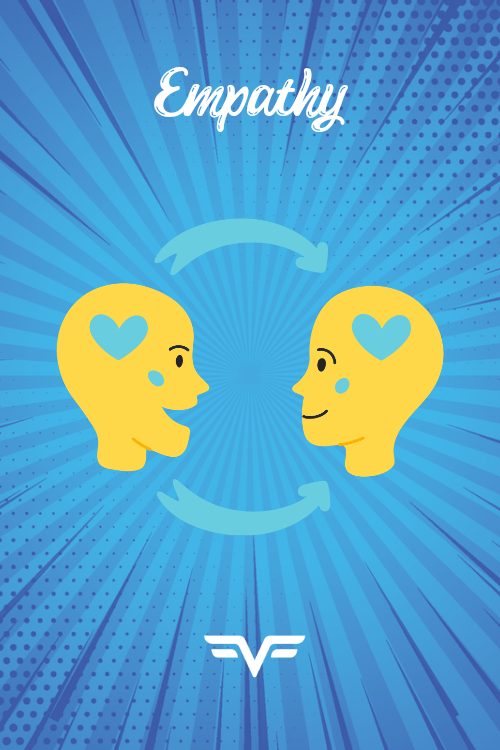Nurturing tomorrow's heroes Today!
Character Chronicles
Empathy & Kindness
Index
Introduction to Empathy & Kindness
Exploring why being kind is crucial in their daily lives and how it positively impacts their friendships and the world around them.
As parents, we all want to raise kind, caring children. Instilling the value of kindness in our kids is so important, and it benefits them and the world they live in. Teaching kindness starts when children are young, and setting a good example is key.
There are many impactful ways we can foster kindness and thoughtfulness in our children. Small acts repeated daily make a big difference over time. Teachable moments also allow us to have meaningful discussions about how to treat others.
The influence of parents in encouraging kindness cannot be understated. With some effort on our part, we can raise kids who help make the world a little bit better…


Nurturing Empathy
Understanding the role of empathy in helping kids understand and share the feelings of others, fostering compassion and consideration.
Empathy, the heart’s secret language, opens doors to a deeper understanding of one another. It’s the ability to step into another’s shoes, to feel their joys and sorrows as if they were our own. When children develop empathy, they become compassionate listeners and genuine friends. They learn to navigate emotions, offering support during challenging times and celebrating successes with genuine enthusiasm.
- Name emotions out loud as you experience them together, like “I can see you’re feeling really frustrated right now!” This builds emotional intelligence.
- Discuss characters’ feelings and perspectives when reading books or watching movies. Ask how they would feel if they were in the same situation.
- Volunteer together at a food bank or animal shelter. Seeing people/animals in need evokes empathy.
- Role play various scenarios where empathy should be shown. Talk through how each person would feel.
- Praise demonstrations of caring, concern and kindness. This reinforces empathy.
- If your child hurts someone, have them imagine how the other feels. Prompt an apology and amends.
- Let kids resolve minor conflicts independently. This teaches compromise and problem-solving.
With consistency and compassion, we can raise kids who exercise empathy. This creates a foundation for good citizenship, relationships and wellbeing as adults. Nurturing empathy will bring more light into this world!
Encouraging Kindness
Practical strategies and age-appropriate activities to encourage children to show kindness, empathy, and respect to their peers.
The Magic of Kindness. Kindness is like a gentle breeze that sweeps through the heart, leaving behind traces of joy and warmth. It’s more than just good manners; it’s a force that elevates the human experience. When our children grasp the magic of kindness, they embark on a journey of creating positive ripples in the lives of others. From a simple smile to a helping hand, these acts of kindness become stepping stones for building lasting friendships and meaningful connections.

- Role play good deeds at home like sharing toys or helping with chores. Praise kind acts.
- Read books about friendship and kindness. Discuss how characters show caring.
- Set up play dates with children who may get left out at school.
- Practice active listening when your child is upset. Show care for their feelings.
- Assign a simple weekly chore that helps the whole family, like setting the table.
- Help your child write thank you notes when receiving gifts or kind acts.
- Discuss the importance of inclusivity. Brainstorm ways to make others feel welcome.
- Model apologizing when you make a mistake.
- Praise your child when you observe kind behavior toward siblings or friends.
- Foster care for the environment through recycling, gardening, or picking up litter.
- Suggest your child sit with someone eating alone at lunch or play with a new student.
Ages 11-12:
- Debate ethical dilemmas together. Ask what the kind thing to do would be.
- Encourage your child to join a volunteer organization like a community theater.
- If your child witnesses bullying, coach them to intervene (if safe) or report it. Praise courage.
- Share stories of times you chose compassion over judgment or pettiness.
- Discuss current events involving injustice. Ask how we can promote kindness.

Developing Emotional Intelligence
Exploring how emotional intelligence plays a vital role in nurturing empathy and developing strong, positive relationships.
Emotional Intelligence (EQ), a compass of the heart and mind it leads us through the intricate terrain of our feelings. It is the compass that guides us to navigate the currents of joy, sorrow, and everything in between. Just as a skilled sailor reads the wind to chart their course, developing emotional intelligence enables us to interpret and manage our own emotions, as well as recognize and respond to the emotions of others.
Kids with higher EQs are better able to empathize, resolve conflicts, and develop strong relationships. Here are some tips to build EQ for:
Ages 6-8:
- Name emotions as you experience them together. “I see you’re really excited about your birthday!”
- Read books featuring characters dealing with different feelings. Ask how they would feel.
- Play feeling charades – take turns acting out emotions like anger or sadness.
- Praise your child when they show concern for a sibling or friend who is upset.
- Talk through emotional outbursts calmly. Help identify the root feeling.
Ages 9-10:
- Discuss why certain events evoke feelings like a sad movie or a holiday.
- Brainstorm positive and negative ways to cope with stressful emotions.
- Model apologizing sincerely after arguments. Explain your feelings and motivations.
- Role play dealing with bullying or peer pressure assertively. Praise walking away.
- Encourage journaling about feelings. Provide non-judgmental feedback.
Ages 11-12:
- Debate choices characters make in books. Ask if they were emotionally wise.
- Share age-appropriate stories from your life. Reflect on what you learned.
- Push them to dig deeper when upset. Ask “what are they trying to say, why does this make them so mad, is there a better and calmer way of expressing their feelings?” Make sure that you really listen-to—understand, this shows deep care.
- Explore acts of historical injustice. Discuss the emotions on both sides.
- Validate feelings around adolescence while still expecting maturity.

Conclusion
With some consistent effort, we can nurture empathy, kindness and emotional intelligence in our kids. This creates a solid foundation for them to build healthy relationships and become considerate adults.
Demonstrating these qualities ourselves as parents is crucial.
The world needs more kindness. As role models for the next generation, we have the power to bring more light into the world by raising compassionate children. Our influence is immense, and so is our responsibility!
Through the practice of gratitude, we become alchemists of our own lives, transmuting moments of despair into glimmers of hope, and turning hardships into stepping stones for growth.
It is a practice that empowers us to embrace the fullness of life, to find joy in the midst of challenges, and to cherish the connections that bind us all.
Gratitude allows us to navigate the ebbs and flows of life with grace and resilience, knowing that even in the darkest of times, there is always a ray of light to be found.
So let us embark on this journey of gratitude, carrying its essence within our hearts. To be awakened each day with a sense of wonder and appreciation for the precious gift of life. May we cultivate a spirit of thankfulness that permeates every interaction, every breath we take. And may we share the beauty of gratitude with others, igniting a spark of hope and inspiration in their lives.
In closing, let us remember that gratitude is not a destination, but a lifelong journey. It is a practice that invites us to slow down, to savor the richness of each moment, and to recognize the countless blessings that grace our lives. Let us embrace gratitude as a way of being, a guiding principle that illuminates our path and infuses our days with a profound sense of purpose and joy. As we embark on this journey together, may gratitude be our compass, our anchor, and our source of everlasting peace.
Complimentary Corner
Our Kindness Reward Coupons for Kids are here to sprinkle a little extra magic into your child’s day. These coupons aren’t just paper, they’re a gateway to spreading smiles, making memories, and sharing heartfelt gestures. Each coupon is a small yet mighty reminder that kindness is a superpower that everyone can possess.
Fuel Your Faith! Join Our Heroic Email List
Unlock Daily Challenges, Hero Training & Faith-Filled Inspiration!



